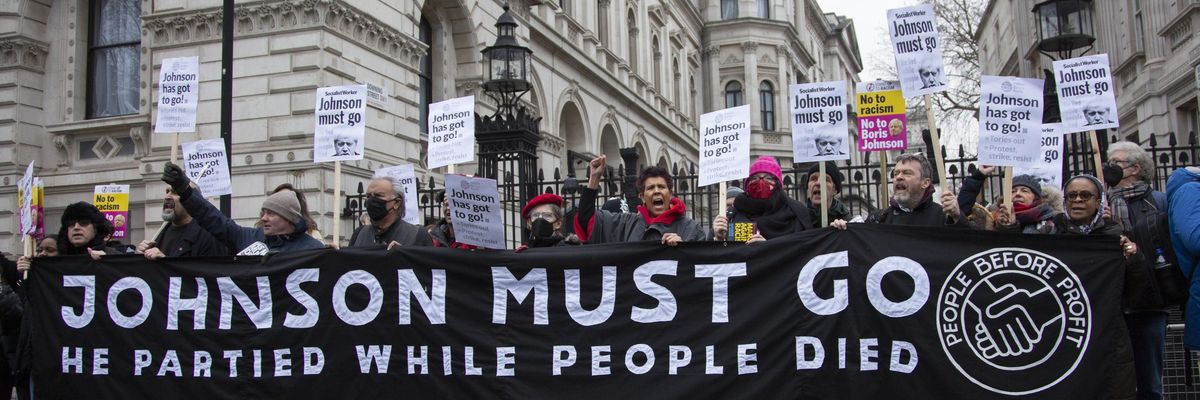We are waiting for the long-promised invasion.
So are the fishes.
-- Winston Churchill, Radio broadcast to the French people October 21, 1940
If these were normal times there would be no need for those of us who live across the ocean from the country that is now governed by Boris Johnson to be apprehensive. His problems are uniquely his own and in ordinary times would not give us even a moment's pause. These are not, all would agree, ordinary times.
As far as Boris is concerned his problems are of his own making and may, if not properly addressed, threaten his ability to retain his premiership. And some in the United States are concerned that his attempts may place the United States in peril. It has all come about because of Boris' fondness for a good time and his willingness to attend a Downing Street Garden party during the pandemic when such gatherings were forbidden. Pictures of the gathering were distributed on the internet at a time when Boris' subjects were themselves subject to a prohibition against such gatherings.
The result of the episode is that now, many months later, Boris finds himself in a position where he may lose the position that enables him to live at 10 Downing Street and, indeed, members of the opposition hope that the party will lead to Mr. Johnson's downfall. It is not, however, a given. There are ways he may be able to retain his position.
One possibility is that he will seek a confidence vote before the summer and, if that is successful, will call for a general election in the fall. If he wins that election he will have overcome the result of having succumbed to a love of parties during the pandemic. That, of course, is not the only possible way Boris can take steps to secure his position. The obvious alternative to a confidence vote or a general election that may be available to Mr. Johnson was presented to us (and Mr. Johnson if he hadn't already thought of it) by one of Kentucky's two United States senators, Rand Paul.
Before his election to the United States Senate, Rand was an ophthalmologist. His expertise in matters of vision has given him unique insights into many aspects of government including foreign policy. During congressional hearings in 2017, when the Senate was considering a vote on a treaty admitting Montenegro to membership in NATO, Senator Paul blocked an attempt for the Senate to vote on the treaty causing former Senator John McCain to observe that: "The senator from Kentucky is now working for Vladimir Putin." (Notwithstanding Senator Paul's efforts, Montenegro was formally admitted to NATO on June 5, 2017.)
Senator Paul's employment by Putin was once again shown during hearings on Putin's war in Ukraine. During a Congressional hearing at the end of April Paul explained that one of the reasons Putin had invaded Ukraine was that Ukraine was once part of the Soviet Union. Paul said that although there was no justification for the invasion of Ukraine by Putin "You could also argue that the countries that it has attacked were. . . part of the Soviet Union" and Putin has long wanted a "sphere of influence" over former Soviet states.
Although Putin's position in Russia is not as imminently threatened as is Boris Johnson's in England, it is undeniable that in the back of Putin's mind is an awareness that by successfully invading former members of the Soviet Union he enhances his stature and his ability to retain control of Russia. And that is, of course, why Rand Paul's observations are cause for alarm for some of us living on this side of the Atlantic.
As most of us know, the United States was once a part of the British Empire. That all came to an end in the period between 1765 and 1791 when those of us who lived in the 13 colonies formed independent states and defeated the British in the Revolutionary War thus gaining independence from the British Crown. Although that defeat of the British is not much discussed today, the concern expressed by some is that, like Putin, Boris Johnson may, in the back of his mind, intend to reclaim the 13 Colonies that Britain lost during the American Revolution. He may hope that in undertaking that task he will prove his ability to govern and retain his position as Prime Minister.
To reclaim what the 13 Colonies comprised in 1776 is of course, a daunting task, but people who are at risk of losing positions of power that they consider valuable are not beyond attempting what most of us would consider a foolish undertaking. This column is not intended to serve as a roadmap should Boris happen to see it. The complexity of fairly dividing up what were the original 13 colonies is itself such a daunting task that it is unlikely Boris would undertake it. Nonetheless, it has given some readers cause for alarm and the purpose of this piece is to give them some assurance that such an invasion is highly unlikely. Rand Paul notwithstanding.




